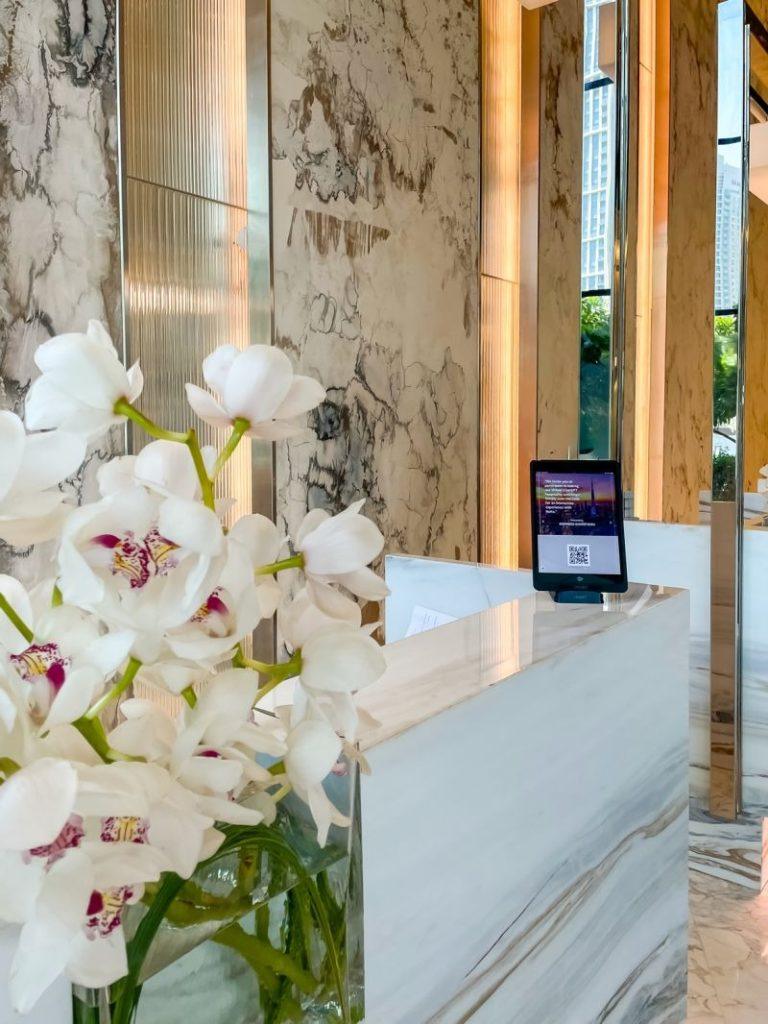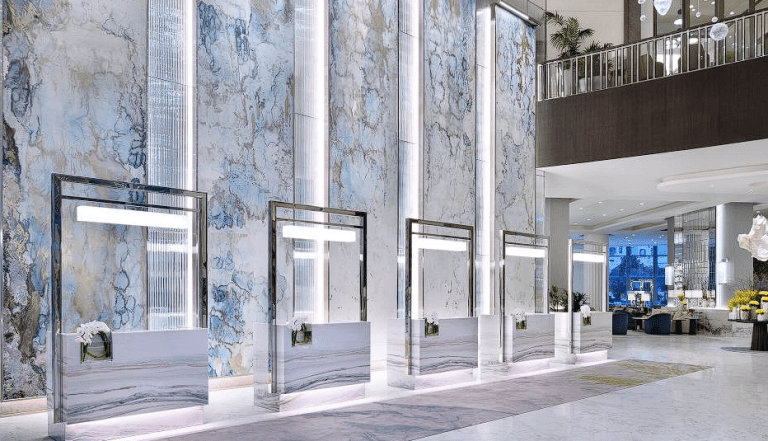By Omar Gouda
In the Gulf’s high-end hospitality scene, AI isn’t just a back-office upgrade; it’s becoming the face of service. From Dubai to Doha, luxury hotels are quietly rolling out AI concierges that handle everything from multilingual guest support to itinerary curation with seamless precision.
These voice- and chatbot-powered systems aren’t just about efficiency; they’re a strategic flex that reinforces a brand image where innovation is woven into indulgence.
Address Hotels’ “Nuha” as the UAE’s First Luxury AI Guide
At the forefront is Address Hotels & Resorts, which in September 2023 introduced “Nuha” at its Address Downtown property in Dubai. Nuha is powered by the ChatGPT model and offers guests conversational, intuitive interaction about the hotel, dining, spa, and even Dubai-wide experiences.

The launch marked the group’s claim to being the UAE’s first luxury hospitality brand to deploy AI specifically crafted for guest interaction.
Nuha isn’t just a digital helpdesk; it’s a full-service guide. Guests can use it to navigate the hotel, browse dining options, schedule spa appointments, and tap into Dubai’s cultural calendar. Its conversational tone and intuitive responses are crafted to feel more like a dialogue than a transaction. Crucially, Nuha is meant to enhance—not replace—the human concierge, offering seamless support while keeping the warmth of hospitality intact.

First Group Hospitality Offering Multi-Channel Services

Dubai’s First Group Hospitality also joined the AI hospitality race in 2025 with a strategic partnership with UK-based startup Inntelo AI. Their goal: to embed an AI-native guest experience and operations platform across their hotel portfolio. The rollout began at TRYP by Wyndham Dubai and is set to expand to flagship properties like Ciel Dubai Marina – Vignette Collection by IHG, positioning the group at the forefront of tech-driven service innovation.
Inntelo AI’s platform reimagines guest interaction as a multilingual, multi-channel experience. Whether through mobile, voice, WhatsApp, or a traditional call, guests can access tailored services in over 40 languages from booking excursions and reserving tables to managing every detail of their stay.
Operational Strategy: Linking AI to Housekeeping and Revenue Tools
The system also links guest requests with housekeeping, scheduling, and revenue optimization tools, creating a unified operational flow that’s as intelligent as it is invisible.
The Gulf’s embrace of AI concierges is driven by a convergence of luxury expectations, brand ambition, and operational strategy. High-touch hospitality in the region demands multilingual, round-the-clock service. For brands like Address Hotels, the technology enhances rather than replaces human warmth, while reinforcing the Gulf’s image as a nexus of innovation and indulgence.
At the backend, platforms like Inntelo AI offer hotel operators a powerful edge: real-time responsiveness, personalized upselling, and data-driven efficiency that turns guest interaction into strategic intelligence.
The Seamless Guest Journey and Operator Advantages
From the guest’s perspective, the impact is immediate. Picture arriving late, checking in through your phone, getting your room code via WhatsApp, and asking the virtual concierge—speaking some 40 languages—for a dinner reservation. Minutes later, you’re seated without waiting in line. After your meal, you ask the bot to book a desert safari for the next day.
It’s smooth, fast, and feels personal. Hotels say this kind of frictionless experience boosts satisfaction, encourages repeat visits, and builds loyalty in a market where service is the key to standing out.
AI concierges help hotels respond faster and avoid peak-hour bottlenecks by easing the load on front-desk and call-center teams. More importantly, they capture nearly all guest interactions, tracking requests, timing, and upsell success—which feeds valuable data into operational analytics. Inntelo reports that 97% of guest queries are handled directly by its AI agents, turning service automation into a strategic asset.
The Balancing Act: Challenges and the Future Hybrid Service Model
Despite the potential, luxury hospitality still hinges on human warmth as some guests value personal greetings over digital efficiency. Over-automation risks diluting the essence of service if not carefully balanced. Operational hurdles also persist, from integrating AI with legacy systems to training staff for hybrid models. Data privacy adds another layer of complexity, especially with multilingual, international guests.
The future of hospitality is shaping up as a hybrid model where AI takes care of routine, scalable, multilingual tasks, while human staff concentrate on high-touch services like personal greetings, tailored problem-solving, and bespoke experiences.
Evolution of AI: Predictive Service and Rising Guest Expectations
As AI concierge platforms evolve to include room automation, predictive service prompts such as offering a guest’s favorite drink upon arrival, augmented reality tours, and in-room voice assistants, the standard for guest expectations will continue to rise.



